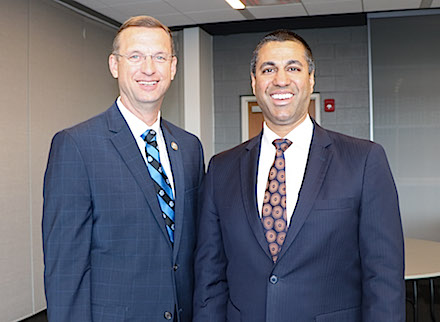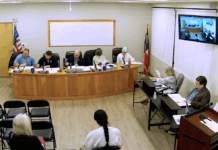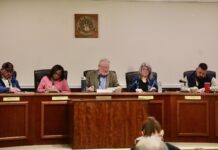
(Dahlonega) —Rep. Doug Collins (R-Ga.) and Federal Communications Commission (FCC) Chairman Ajit Pai gathered stakeholders from across Northeast Georgia to address the challenges of delivering affordable, accessible internet access to rural communities. Friday’s meeting included local representatives, chamber of commerce leaders and internet service providers.
“You know, I always talk about the economic gap, the opportunity gap, or the economic divide. I call this one a dream divide,” said Collins, opening the forum.
“The question is, if the next generation and this current generation is going to dream, is the dream divide keeping them away because we can’t provide broadband service to them? Why should 60 to 70 miles [from Atlanta] determine [who] can take AP online courses or if you can study at home or maybe just connect back to your business from two miles down the road? It’s a dream divide, so that’s why this is important. This is why we’re here today talking about this, and this is why Chairman Ajit Pai is here today.”
As head of the FCC, Pai has focused on promoting competition, innovation and investment in America’s broadband infrastructure and has traveled extensively to hear from people in areas underserved by internet providers. Collins has worked with Pai and the FCC throughout this Congress and introduced the Gigabit Opportunity (GO) Act, which focuses on incentivizing broadband investment in rural communities and dovetails with the FCC’s efforts to expand broadband access.
“It was incredible to see some of the energy and passion surrounding internet access here in North Georgia, and, going forward, I think the FCC is committed to being willing to partner to make sure everyone in North Georgia—Dahlonega, surrounding communities—is able to take advantage of what I call ‘digital opportunity,’” said Pai following the event.
Among speakers at the forum were Georgia State Representative Terry Rogers (R-Clarkesville), Paul Belk, President and CEO of North Georgia Network, Steve Fortmann, owner of Paladin Wireless, Dr. Drew van Horn of Young Harris College and Kevin Woody, a community pharmacist with a store in Lumpkin County.
Woody explained that he can’t receive prescriptions from doctors or fill them for sick patients when his pharmacy’s internet goes out.
“It matters to this county. It matters to small businesses, but it matters to the individual. I mean, lives are in danger when internet is not readily available. . . . We can’t care for you as health care practitioners if we don’t have access to broadband service,” said Woody.
Poor internet access has become a barrier to educational and business opportunities in Northeast Georgia, even though the region lies just outside one of the nation’s largest cities. According to van Horn, Young Harris’ ability to offer courses to Towns County High School students remotely depends on reliable broadband service.
One of the people pioneering solutions to broadband limitations is Steve Fortmann of Paladin Wireless. He argued that small internet service providers like his are the ones focused on delivering last-mile service to consumers, and they’re not depending on laying fiber underground to reach people.
“We are going for the last-mile, rural, residential customer. The one that everybody skips across. That’s who we’re going for. I have towers set up in areas where there is only like 50 people, but right now those 50 people are getting 100 [mbps] service—out in the middle of nowhere, where cows outnumber the human population,” said Fortmann.
Local representatives and stakeholders took the opportunity to speak with Chairman Pai and presenters like Fortmann after the event about the broadband ecosystems in their communities.
“By having the FCC chairman here today proved the—not only what we have talked about broadband being a digital divide but also a dream enhancer. He’s here to know and hear from the stakeholders. What we saw today was a community willing to come together to solve these problems,” said Collins.
Background:
The GO Act would incentivize private investment in rural broadband by allowing companies to defer certain capital gains taxes when they convert those gains to long-term investments in broadband infrastructure within state-designated “Gigabit Opportunity Zones.” While many rural and low-income areas lack access or are limited to a single provider, this bill would also encourage market competition by enabling companies expanding infrastructure in Gigabit Opportunity Zones to expense the cost of any gigabit-capable equipment on the front end.
This legislation would foster competition, streamlining and new investment in such underserved areas by encouraging states and local governments to remove the burdens of outdated public policies on the broadband industry. It complements the FCC’s plan to improve broadband access throughout the country.






